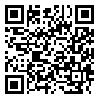Volume 15, Issue 60 (8-2021)
etiadpajohi 2021, 15(60): 351-372 |
Back to browse issues page
Download citation:
BibTeX | RIS | EndNote | Medlars | ProCite | Reference Manager | RefWorks
Send citation to:



BibTeX | RIS | EndNote | Medlars | ProCite | Reference Manager | RefWorks
Send citation to:
Yazdani H, saqqezi A. The Role of Strategic Engagement Regulation and Attitude toward Marriage in Predicting a Person's Tendency to Risk-Taking in Dependence on Drug, Cigarette, and Alcohol Use. etiadpajohi 2021; 15 (60) :351-372
URL: http://etiadpajohi.ir/article-1-2513-en.html
URL: http://etiadpajohi.ir/article-1-2513-en.html
M.A. Student of Family Counseling, Department of Counseling, Razi University, Kermanshah, Iran
Abstract: (2857 Views)
Objective: The present study was conducted aiming to investigate the role of strategic engagement regulation and attitude toward marriage in predicting a person's tendency to risk-taking in dependence on drug, cigarette, and alcohol use. Method: This study was a descriptive-correlational research. The statistical population included all students of Islamic Azad University, Central Tehran Branch in 2018-2019, and 308 people were selected as the statistical sample by convenience sampling method. Data were collected using the risk-taking scale, the strategic engagement regulation scale, and the marital attitude scale. Analysis was performed using Pearson's correlation coefficient and stepwise multivariate regression methods. Results: The results showed that a pessimistic attitude toward marriage was positively and significantly related to the risk-taking of drug, cigarette, and alcohol use, while optimistic, realistic, and idealistic attitudes were negatively and significantly associated with the risk-taking of drug, cigarette, and alcohol use. Also, strategic engagement regulation had a significant negative relationship with the risk-taking of drug use, and no significant relationship with the risk-taking of cigarette and alcohol use. Regression results revealed that the pessimistic attitude and the optimistic attitude predicted 4%; the pessimistic attitude, the idealistic attitude, and strategic engagement regulation predicted 12%; and strategic engagement regulation and the pessimistic attitude predicted 4% of the variance in the risk-taking of cigarette, drug, and alcohol use significantly. Conclusion: It can be concluded that in prevention programs of risk-taking in cigarette, drug, and alcohol use, it is necessary to consider the role of factors in strategic engagement regulation and attitude toward marriage.
Keywords: Strategic engagement regulation, Attitude toward marriage, Risk-taking, Drug, Cigarette, Alcohol
Type of Study: Research |
Subject:
Special
Received: 2020/12/17 | Accepted: 2021/08/1 | Published: 2021/07/15
Received: 2020/12/17 | Accepted: 2021/08/1 | Published: 2021/07/15
| Rights and permissions | |
 |
This work is licensed under a Creative Commons Attribution-NonCommercial 4.0 International License. |






